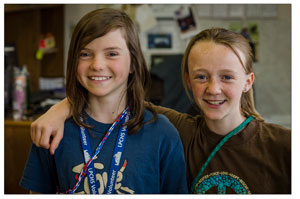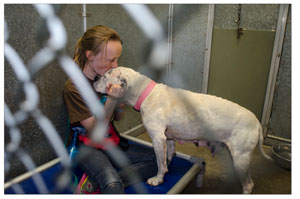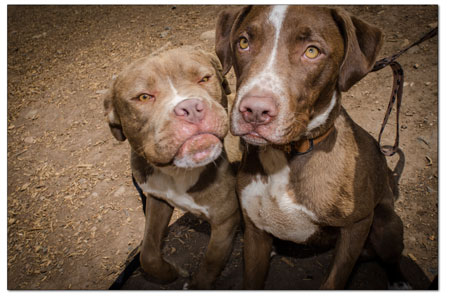|
Pit bull Griz, left, and Yohan, a pit bull mix, vie for treats during their daily exercise routine at La Plata County Humane Society recently. About a third of the dogs for adoption at the shelter are pit bulls or pit bull mixes, which carry a stigma of being aggressive. However, two local middle school girls are working to change that perception./Photo by Jeremy Wade Shockley |
Pit Bulls for People
Local girls work to change perceptions, help pit bull adoptions
by Jen Reeder
School’s out! For lucky kids across the country, summer vacation promises sleeping in, BBQs, outdoor adventures – and no tests. But for Durango’s Morgan Wells, 11, and Wyllow Hildner, 12, the most exciting thing about the break is the chance to spend more time volunteering at the La Plata County Humane Society (LPCHS) and helping pit bulls get adopted through their advocacy group, Pit Bulls for People.
JustthefactsWhat: 12th annual Adopt-A-Thon |
“We spend most of our week here,” Hildner says of the shelter. “I call it my second home.”
The girls met through their volunteer work assisting kennel technicians and walking dogs at LPCHS last summer. Wells conceived of Pit Bulls for People after meeting several friendly pit bulls in the shelter’s “Lonely Hearts Club” – animals that have gone unadopted for more than 45 days. Often, pit bulls are overlooked because of their fearsome reputation.
“I think pit bulls are great dogs, no matter how people see them,” Wells says. “I think they’re just misunderstood and that they need a second chance – some of them need a first chance.”
Hildner had developed an interest in pit bulls, an umbrella term that includes American pit bull terriers, American Staffordshire terriers, Staffordshire bull terriers and pit bull mixes, after watching the Animal Planet show “Pit Bulls and Parolees,” and the two girls decided to team up. They built a website that features adoptable pit bulls at the LPCHS, information about the “breed” and resources such as training tips. Wells says often people will email them and ask for more information about a specific dog, and then request that the girls meet them at the shelter to introduce them to their potential pet.
“Our website has profiles of all the dogs that describes their personality, what they know, what they need to work on, and basically describes what the perfect home would be, whether it’s being with an Olympic athlete or lying on the couch and not doing anything,” she says.
Chris Nelson, shelter director at the LPCHS, says it’s a “good feeling” to see Wells and Hildner working so hard to save the dogs. At least a third of the adoptable dogs at LPCHS are pit bulls. Nelson attributes this to their bad reputation and the fact than many owners do not spay or neuter them.
He says the key to training any dog to be a good family pet – including pit bulls – is early socialization.
 Wyllow Hildner, left, and Morgan Wells are Durango middle school students who volunteer their time at the La Plata County Humane Society championing the program Pit Bulls for People./Photo by Jeremy Wade Shockley |
“If you take a puppy of any breed and you take it home and you keep it at your house, but you don’t take it to puppy classes, you don’t take it to the dog park, you don’t take it around other dogs and you keep it isolated, and then you suddenly want to walk it down Main Street where there’s 50 other people walking dogs, it’s going be frightened and it’s not going to know how to socially interact,” he says. “We don’t do that with our children – why should we do that with our dogs? You can’t just expect to add food and water and have a perfect dog.”
He says pit bulls were historically beloved in England and America for their use as “nanny dogs.”
“They were used on farms to watch over the children while the families were out working the fields,” he says, adding that Petey, the dog featured in the classic TV show “The Little Rascals,” was a pit bull.
Things started to change in the 1980s, when gangs starting using pit bulls as protectors and they became popular in dogfighting rings. Such abuse led to aggression, and graphic images of pit bull attacks have been highlighted in the media for the past several decades. This negative attention has created the impression that pit bulls are a dangerous “bully breed,” and now some homeowner insurance policies exclude pit bulls, and municipalities like Denver have even banned them as pets. This trend makes the work of groups like Pit Bulls for People crucial to saving nonaggressive pit bulls from being euthanized.
“Judge the dog – not the breed,” Nelson says.
Durango resident Stacy Falk adopted a 1-year-old pit bull named Puddin from LPCHS in July 2013 after the dog was found pregnant and roaming the streets. Falk hired trainer Traci Moriarty, from Durango Dog College, to help curb Puddin’s separation anxiety and become accustomed to her crate. Now Puddin is preparing to take the American Kennel Club’s Canine Good Citizen test, and Falk hopes to certify her as a therapy dog in the future.
“Puddin has been one of the biggest highlights of my life over the last year,” Falk says. “She can just totally read your emotions. If you’re sad, she’ll sit on your lap and make you happy … she’s so loving.”
Despite Puddin’s sweet temperament, she has faced some unwarranted fear from strangers. In one instance, when Puddin was playing off-leash with other dogs on private property, a cyclist spotted Puddin, jumped off his mountain bike and threw it at her.
“I tried to calm the guy down and introduce him to Puddin, but he wanted nothing to do with her,” she says.
 Morgan Wells kisses one of the many pit bulls for adoption at the Humane Society shelter./Photo by Jeremy Wade Shockley |
Realtor Tina Miely agrees that pit bulls make wonderful pets. She and her husband, Tony, have had three pit bulls. Roxy was a popular fixture at 4 Corners River Sports until she died, and now Cisco, a male pit bull mix adopted from LPCHS, goes to work with his dad.
“I love the breed – I’m a big fan,” Miely says. “All three of our pit bulls have always been around kids and socialized, and we’ve never had any issues with any of them.”
She says the issue lies with bad owners, not with pit bulls.
“I firmly believe any breed of dog when they’re mistreated and abused and starved and beaten will turn aggressive.”
Miely says she is “excited” Wells and Hildner started Pit Bulls for People. The girls are planning to create a shelter dog test, similar to the Canine Good Citizen test, and train dogs to pass it. When they do, they will get a certificate on their kennel card – potentially helping them get adopted faster. Other plans include a fundraiser for a low income spay/neuter clinic, and possibly T-shirts.
Their passion runs deep: both girls plan to have careers in rescue after graduating from college. Wells hopes to be shelter director of the LPCHS someday.
“I love dogs, and I think it’s cool that there are humane societies so that dogs don’t have to be living out on the streets, trying to not get hit by cars or eaten by mountain lions,” Wells says.
Hildner wants to start her own rescue organization in a place with a high population of homeless pets.
“I really love the rescuing part of it – I’ve watched videos on YouTube of dog rescues, and I just really enjoy seeing how they’re so afraid out there, and then once you bring them in, you give them a bath and everything, they just become the best dogs and they’re so thankful for it,” she says.
Ken Hibbard, LPCHS education and outreach coordinator, says he is inspired by the girls’ commitment.
“They’re ambassadors for the dogs,” he says. “It’s good stuff. They’re our future, you know?”
For more information about Pit Bulls for People, visit www.pitbulls4people.org or email pitbulls4people@gmail.com. Donations can be made to the group via the La Plata County Humane Society at 1111 S. Camino Del Rio (mention Pit Bulls for People on the check or when calling 970-259-2847). For tips on adopting a pit bull, visit: www.aspca.org/fight-cruelty/dog-fighting/tips-adopting-pit-bull.
In this week's issue...
- December 18, 2025
- Let it snow
Although ski areas across the West have taken a hit, there’s still hope
- December 18, 2025
- Look, but don't take
Lessons in pottery theft – and remorse – from SW Colorado
- December 11, 2025
- Big plans
Whole Foods, 270 apartments could be coming to Durango Mall parcel

